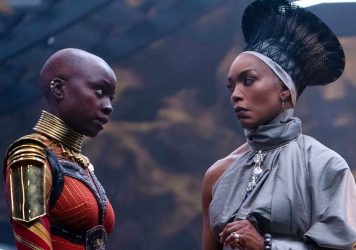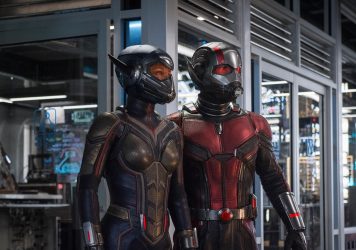Scott Lang and his pint-sized family of heroes face off against Kang the Conquerer in this latest uninspiring Marvel outing.
Peyton Reed’s Ant-Man films have been something of a safe harbor in the wider Marvel Cinematic Universe: charmingly low-stakes outings amid the apocalyptic stakes of the wider franchise. Amid their visually homogenized peers, their clever sight gags of rapidly shifting scale and unabashed Silver Age goofiness have marked Reed’s two MCU entries as some of the few contemporary superhero films to feel affectionate rather than self–conscious about their comic-book origins.
But the demands of the Marvel machine come for all its properties eventually, and it falls to Ant-Man and the Wasp: Quantumania to offer the first real direction in the MCU’s overarching narrative since Avengers: Endgame. Scott Lang (Paul Rudd), partner Hope (Evangeline Lilly), and their shared family find themselves sucked into the subatomic Quantum Realm seen in glimpses in previous installments. There, they must contend with Kang the Conqueror (Jonathan Majors), a dimension-hopping tyrant seeking to escape from this surreal prison after being exiled there for his rampages across time and space.
Almost immediately, the movie buckles under the pressure to simultaneously deal with Kang’s threat and establish him for future movies as the official new Big Bad of the MCU. It doesn’t help that Kang scarcely feels different from Thanos despite Majors’s attempts to add shades of calculating omniscience beyond the previous archenemy’s brute force. Kang forces Scott and the rest into a fetch quest to retrieve the means of his escape in a manner that recalls much of the Infinity Stone hunting of the last Avengers movies.
While the Quantum Realm felt strange and unique in earlier, briefer views, here is quickly falls in line with much of Marvel’s recent CGI output: splashy but nondescript, all psychedelic purple clouds and gargantuan, brutalist military buildings that homogenize every location in a universe of seemingly infinite possibility. The action is similarly blown up from the franchise’s erstwhile emphasis on Scott’s quick-timing size changes in one-on-one fights to the kind of overwhelming but incoherent spectacle that defines nearly all superhero movie third acts.
And where the earlier Ant-Man films wrung comedy out of Rudd’s easygoing charm and a relatively earnest banter compared to the irony of other Marvel movies, Quantumania is clearly informed by writer Jeff Loveness’s tenure on Rick & Morty. Jokes tend to consist of repeating phrases over and over in the cadence of that show’s deliberately shoddy improvisation, and the various creatures encountered by the heroes are filtered through its vulgar imagination, such as a gelatinous being who openly envies the humans’ orifices.
This tackiness even carries over to how the film develops its themes. At the start of the story, Scott’s daughter, Cassie (Kathryn Newton), urges her father out of his post-Thanos complacency that people still need help in the world. It’s a simple but effective bit of comic-book optimism. By the end, though, that message has been corrupted into the cruder, blunter statement “don’t be a dick” – an oddly glib note on which to end a story about a lesser superhero learning to recommit himself to the greater good.
Little White Lies is committed to championing great movies and the talented people who make them.
Published 15 Feb 2023
Ant-Man is Marvel's most entertaining sub-franchise.
CGI bloat and bad jokes sink another superhero film.
The post-Endgame MCU continues to be a slog.

Writer/director Ryan Coogler expands his colonialist critique in this epic MCU sequel which also pays moving tribute to the late Chadwick Boseman.

Marvel checks in with their most diminutive hero in this entertaining Infinity War Part Two pit-stop.